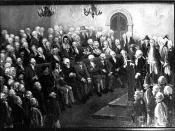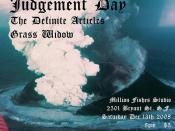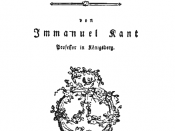Immanuel Kant argues that we posses knowledge that is both a priori and a posteriori. In "The Critique of Pure Reason", Kant explores the difference between a priori knowledge and a posteriori and between analytic and synthetic judgments. He begins by distinguishing what "pure" a priori knowledge is. He says that for a priori knowledge to be pure it has to be independent of not only one particular experience but from all experience. Kant uses the example,
...(W)e would say of a man who undermined the foundations of his house, that he might have known a priori that it would fall, that is, that he need not have waited for the experience of its actual falling. But still he could not know this completely a priori. For he first had to learn through experience that bodies are heavy, and therefore fall when their supports are withdrawn.
He defines an a priori judgment as having no possible exception and not being derived from experience.
Therefore, a statement can be justified as a priori if, on the basis of pure thought or reason, one has a reason to think that the proposition is true. An example of a pure a priori statement is "every alteration must have a cause" because no prior knowledge is needed to understand the concept that everything that happens has a cause.
Kant argues that a priori and a posteriori knowledge must exist together because one cannot exist without the other. If you examine any object and prove everything you know about it to be a posteriori, you are still left with the a priori concept that it is in fact an object and that it takes up space:
If we remove from out empirical concept of a body, one by one, every feature in which...


